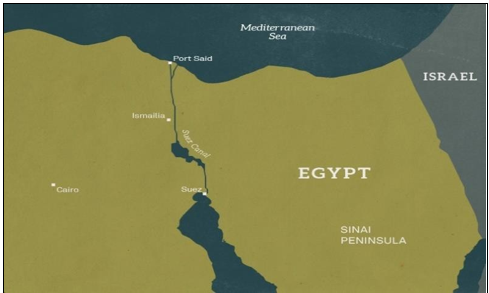Answer:
THE APPROACH
INTRODUCTION: Write, in brief, about the Suez Crisis of 1956 as a significant event in post-1945 British history.
THE BODY
-
- Discuss the key events leading up to the crisis.
- Describe how the crisis led to decline of Britain as a world power.
CONCLUSION: Conclude by stating that Suez crisis led to the end of British imperialism.
THE INTRODUCTION:
The 1956 Suez Crisis was one of the most significant events in post-1945 British history when Britain along with France and Israel invaded Egypt to recover control of the Suez Canal. The crisis was precipitated by a series of events involving Egypt, Britain, and France, and its resolution significantly altered the geopolitical landscape and highlighted Britain’s declining status.
THE BODY:
The Suez Canal crisis
-
- The Suez Canal in Egypt was an important asset for Britain after the Second World It was central to maintaining links with its remaining overseas possessions and the main source of oil in the Middle East.
- Britain had retained a series of military bases in Egypt located along the length of the canal in an area known as the Canal Zone.

-
- Egyptian authorities increasingly objected to the British presence and in October 1951 they broke the Anglo-Egyptian Treaty of 1936, which had allowed Britain to station troops in the country until 1956.
- They began to actively encourage attacks on British installations and personnel.
- These attacks took the form of demonstrations, riots, attacks on servicemen and their families and the sabotage of facilities often condoned by or with the active participation of the Egyptian Police.
- In January 1952, these attacks led to British troops storming the Egyptian police barracks at Ismailia to suppress unrest in the area.
- Following a military coup by the Free Officers Movement and subsequent revolution, the Egyptian ruler, King Farouk was forced to abdicate in July 1952.
- The Revolutionary Command Council, which replaced him, intensified Egyptian demands to take control of the Suez Canal and seized all European-owned property. Two years later, Britain agreed to withdraw its troops from the Canal Zone by June 1956.
Events Leading to the Suez Crisis
-
- Nationalization of the Suez Canal: The immediate cause of the crisis was the nationalization of the Suez Canal by Egyptian President Gamal Abdel Nasser in July It was driven by pan- Arab ambitions and a desire to assert Egyptian sovereignty.
- Cold War: The crisis unfolded in the backdrop of Cold War. United States was conscious of Nasser’s perceived tilt towards the Soviet Union. Therefore, US does not want to push Egypt towards the USSR and thus refrained from supporting Britain and France.
- Failed Attempt of US: Western nations, especially the United States, had previously given Egypt financial support for the building of the Aswan Dam. However, this promise was withdrawn which led Nasser to nationalize the Canal in order to finance the project.
- Decline of British Imperial Influence: Due to post-WWII conditions, Britain’s global influence was shaken which made it more dependent on alliances.
Impact on Britain’s Status as a World Power:
-
- Rise of US and USSR: In the aftermath of the Suez Crisis, Britain and France once the seat of vast colonial empires found their influence as world powers weakened as the United States and Soviet Union took a more powerful role in global affairs.
- Diplomatic Isolation: As a result of the crisis, Britain found itself isolated diplomatically, especially from the US, which fiercely opposed the invasion and put financial pressure on Britain to withdraw.
- End of Imperial Ambitions: Suez Crisis revealed the limitations of Britain’s military and economic power post-World War II. It proved that without help of America, Britain could no longer act alone or pursue its imperial goals.
THE CONCLUSION:
The Suez Crisis was a result of culmination of factors and marked a transformative moment in 20th-century history. It symbolized the end of British imperial dominance and led to foundation of a new world order where the United States and the Soviet Union emerged as the primary arbiters of international affairs, and power of former colonial powers like Britain declined.
Spread the Word
